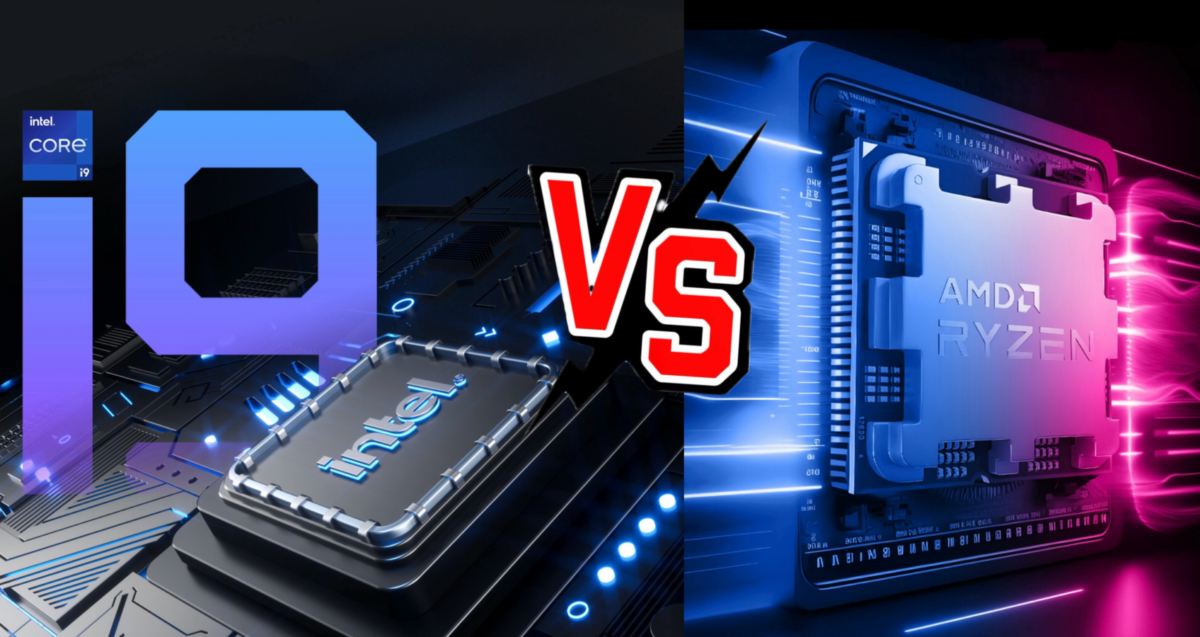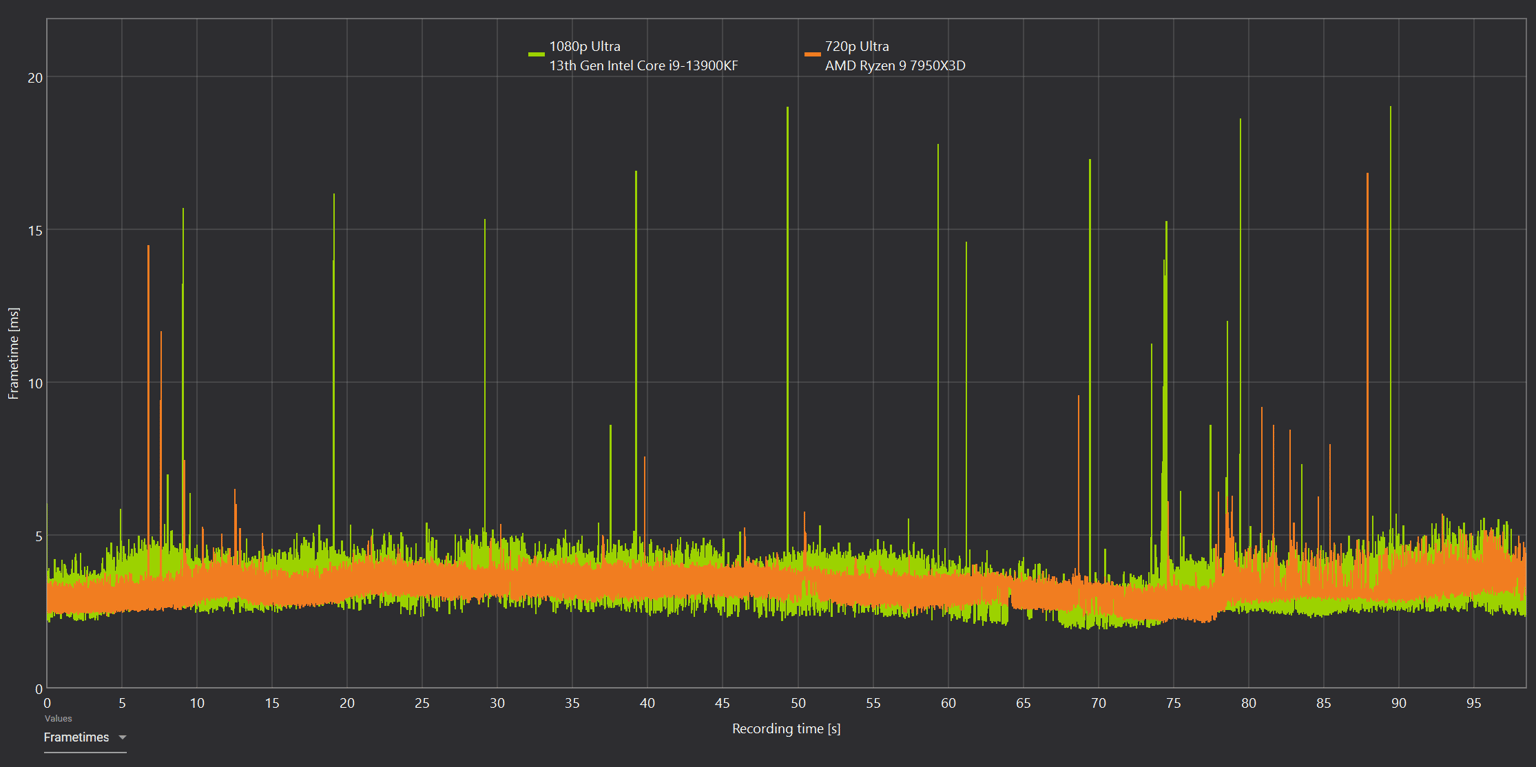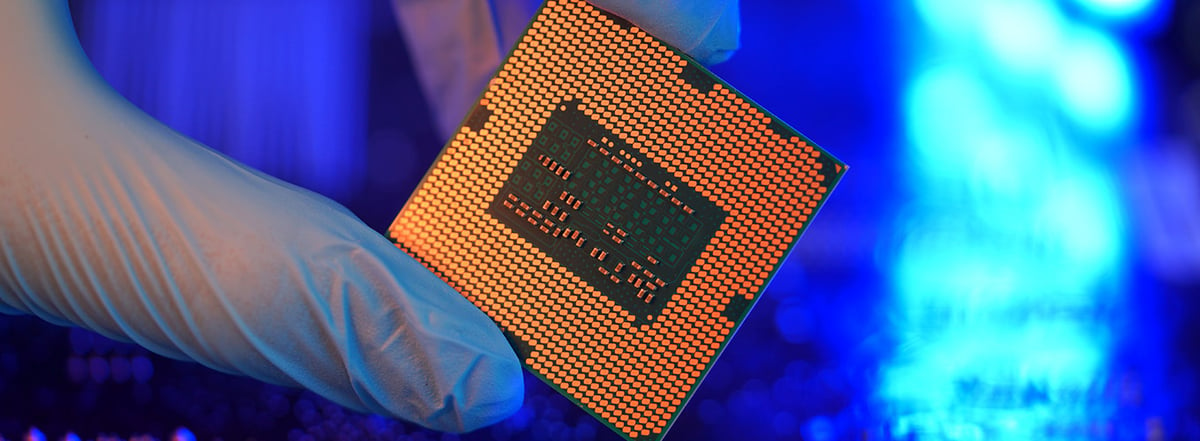Ryzen and Intel CPUs are the leading contenders in the processor market. Each offers unique performance and price points, catering to different user needs.
AMD's Ryzen processors typically excel in multi-threaded tasks and offer competitive pricing, making them attractive for budget-conscious consumers and those who need efficient multitasking performance. On the other hand, Intel CPUs generally provide higher clock speeds and better single-threaded performance, which appeals to gamers and users with applications that prioritize such operations.
Both brands continue to innovate, with AMD leveraging its Zen architecture and Intel advancing with its Core series. Choosing between Ryzen and Intel processors depends on your specific computing requirements, budget, and brand preferences. As the competition heats up, both AMD and Intel consistently push the envelope in processor technology, leading to regular updates and releases that aim to outdo each other in raw performance and power efficiency.
Credit: www.avast.com
Introduction To The Rivalry
The competition between AMD and Intel has been a cornerstone of the computer processor industry, shaping the landscape of computing power and performance for decades. This legendary rivalry, akin to a high-stakes chess game, has driven both companies to innovate relentlessly. Their battle has not only advanced technology but has also provided consumers with an ever-expanding array of choices. In this section, we explore the intricate narrative behind these two titans clashing in the silicon arena and dissect the influential product lines that continue to redefine the modern computing experience.
Historical Context Of Cpu Battles
Intel and AMD have been embroiled in a relentless tug-of-war for dominance in the CPU market. The conflict can be traced back to the 1980s, with Intel initially holding a significant lead thanks to its early success with the x86 architecture. AMD, not to be outdone, licensed the x86 technology and became a formidable competitor. Through the 1990s and 2000s, the rivalry intensified, with both companies alternately leapfrogging over each other in terms of performance, often influenced by technological innovations and strategic business moves. This backdrop of fierce competition has set the stage for the modern state of the processor battlefield.
Overview Of Amd’s Ryzen And Intel’s Core Series
Over the last several years, AMD's introduction of the Ryzen series has brought about a significant shift in the battle dynamic. These processors, which boast high core counts and impressive multi-threading capabilities, have been well-received for their performance per dollar ratio, challenging Intel's dominance. In response, Intel’s Core series, with its advanced single-threaded performance, continues to excel in tasks that favor clock speeds and IPC (Instructions Per Cycle). With each new release cycle, users eagerly anticipate the next advancements, as Ryzen and Core processors increasingly refine compute power and energy efficiency to cater to an extensive range of applications and markets.
| Feature | AMD Ryzen | Intel Core |
|---|---|---|
| Core Count | Up to 16 Cores | Up to 10 Cores |
| Thread Count | Up to 32 Threads | Up to 20 Threads |
| IPC Performance | High | Higher |
| Power Efficiency | Improved with newer generations | Optimized at top-tier SKUs |
| Integrated Graphics | Available on select models (APUs) | Available on most models |
With technologies such as AMD's Zen 3 architecture and Intel's 11th and 12th Gen CPUs with hybrid architecture, the choice between Ryzen and Core extends beyond mere preference and taps into the unique demands of users' workloads. Consequently, the AMD versus Intel debate continues to be vibrant and hotly contested, with each new product reveal eagerly anticipated by enthusiasts and casual users alike.

Credit: www.geekompc.com
Performance Analysis
When considering a new processor, the battle between AMD's Ryzen and Intel's Core series is unavoidable. The competition heats up particularly in areas like benchmarking tests for gaming and multitasking, power efficiency and thermal performance, and system compatibility and future-proofing. This analysis dives into each facet to provide a clearer picture of which processor might lead the race suited to user-specific needs.
Benchmarking Tests: Gaming and Multitasking
Benchmarking Tests: Gaming And Multitasking
Gaming and multitasking performance are crucial metrics for assessing processors. With a series of rigorous benchmarking tests, the prowess of both Ryzen and Intel chips has been evaluated.
- Ryzen: Known for its excellent multiprocessing abilities, thanks to the higher thread counts typically on offer in their product stack, which gives gamers and heavy multitaskers a significant edge.
- Intel: Often leads in single-threaded applications, which can translate into higher FPS in certain games. Intel's latest generations have closed the gap in multithreaded performance.
However, the actual performance can vary based on other system components, in-game settings, and software optimization. Typically, users may notice the differences in highly-threaded tasks and CPU-intensive games.
Power Efficiency and Thermals
Power Efficiency And Thermals
The power consumption and heat generation of a processor are significant for both system builders and everyday users. Lower power draw usually means greater efficiency and cooler operation, which in turn can lead to longer component lifespan and quieter systems.
| Processor | Power Efficiency | Peak Temperatures |
|---|---|---|
| Ryzen | Typically features better performance per watt | Depending on the model and load, can remain comparatively cool |
| Intel | Has made strides in recent architectures to improve efficiency | May require more robust cooling solutions at high performance |
Being mindful of these aspects will guide users not only in processor choice but also in selecting accompanying hardware such as power supplies and cooling systems.
Compatibility and Future-Proofing
Compatibility And Future-proofing
In the rapidly advancing tech world, the longevity and adaptability of a system's hardware could not be more critical. Compatibility and future-proofing ensure that your investment remains potent for as long as possible.
Ryzen has a commendable reputation for maintaining socket compatibility across several CPU generations, which might appeal to users aiming for future upgrades without changing their entire motherboard.
In contrast, Intel often requires a new motherboard with each one or two generations, potentially increasing the total cost of ownership and upgrade complexity in the long run.
Assessing these variables is essential in predicting the system's relevancy and performance with forthcoming software and games.
Market Impact And Consumer Choices
The battle between Ryzen and Intel has been not just a clash of technologies, but a significant factor shaping the desktop and laptop landscape. Every step these tech giants take resonates through the market, influencing what consumers can buy and how much they need to spend. People seeking the ideal balance of power and price must navigate this dynamic terrain. We'll explore how the rivalry affects market share, pricing, and consumer buying profiles, as well as predict the future of CPU development.
Market Share And Pricing Wars
The market share battleground reflects the intense competition between Ryzen and Intel. Not long ago, Intel dominated the CPU space, but Ryzen's emergence has disrupted this landscape. Recent reports reveal a tug of war for dominance, with swings in preference influenced by performance benchmarks, core counts, and power efficiency. This rivalry extends into pricing wars. Both companies frequently adjust prices to gain an edge or react to market changes, creating a dynamic price-performance ratio that benefits consumers.
- Intel's market position: Historically strong but recently challenged.
- Ryzen's growth: Substantial gains leading to increased market share.
- Impact on consumers: More choices and better pricing models.
Consumer Profiles: Who Buys What?
Different users gravitate toward either Ryzen or Intel based on specific needs and preferences. Brand loyalty, intended use, and budget are key factors influencing the decision.
| Ryzen Consumer | Intel Consumer |
|---|---|
|
|
Future Trends In Cpu Development
The future of CPU development teems with potential breakthroughs and innovations. With a growing emphasis on AI and machine learning, both Ryzen and Intel are expected to integrate advanced capabilities to cater to emerging technologies. Expect fierce competition to drive advancements in energy efficiency, integrated graphics performance, and processing power. The push for smaller fabrication processes continues, aiming to deliver better performance with lower power consumption.
- Shrinking chip architectures
- Integrated AI capabilities
- Hybrid chip designs with specialized cores
Ecosystem And Support
Entering the realm of modern computing, we often encounter the perennial debate: AMD Ryzen versus Intel. A pivotal aspect rarely outshone is Ecosystem and Support, a critical factor influencing user experience, performance, and future-proofing. This discourse will unravel the multifaceted ecosystem including motherboard compatibility, overclocking potential, software optimization, and the level of support offered by communities and manufacturers alike. Let's dive into what both giants have laid on the table.

Credit: pcge.eu
Motherboard Options And Overclocking
The motherboard serves as the backbone of a PC's ecosystem, and both Ryzen and Intel boast a myriad of options designed to cater to various needs. AMD, with its forward-thinking AM4 socket, effortlessly accommodates a wide range of processors, fostering an environment conducive to flexibility and upgradability. Ryzen’s compatibility with B450 to X570 chipsets allows users from different budget realms to enjoy the benefits of their technology stack.
| Chipset | Feature Set | Ryzen Series Compatibility |
|---|---|---|
| X570 | PCIe 4.0, Overclocking | Ryzen 2000-5000 Series |
| B550 | PCIe 4.0 (with limitations), Overclocking | Ryzen 3000-5000 Series |
| B450 | Cost-effective, Overclocking | Ryzen 1000-5000 Series (with BIOS update) |
Intel, on the flip side, courts the high-end market with its Z series chipsets, debuting exclusive technologies and overclocking headroom. With concerns on upgrade paths, Intel often requires new chipsets for the latest CPUs, making frequent motherboard changes a necessity for upgraders. However, Intel's extensive array of options, from H310 to Z490, ensures a fit for every user.
Software Optimization And Driver Support
Beyond hardware, software optimization and driver support play a pivotal role in harnessing the full potential of your CPU. Intel's lengthy tenure in the market translates to extensive software optimization. Producers of various applications and games often build and test their creations on Intel architectures, ensuring stable performance and compatibility right out of the box.
AMD has significantly stepped up its game with Ryzen, rapidly expanding its influence and compatibility across software ecosystems. With frequent driver updates and enhancements, Ryzen cuts the gap, offering optimal performance across a multitude of applications. Their nurturing of developer relations promises a bright future for software optimization on their platforms.
Community And Manufacturer Support
A vibrant community and proactive manufacturer support can alleviate numerous user concerns, from troubleshooting issues to performance tuning. Intel has long had a massive community presence, due to its broad user base, with forums, guides, and expert advice widely available. Their direct support channels often receive commendations for responsiveness and expertise.
- Intel official communities
- Dedicated support channels
- Widespread user-generated content
AMD has crafted a robust support structure for Ryzen through engaging online forums and direct support. Their commitment is evident in the timely BIOS updates and transparency about product developments. The enthusiastic Ryzen community, burgeoning by the day, contributes significantly to troubleshooting and optimizations, solidifying AMD's presence in user support.
- Community-driven forums like Reddit's r/Amd
- AMD support and knowledge base
- Active social media engagement
Final Verdict
The fierce competition between AMD's Ryzen and Intel's Core processors has been a hot topic for tech enthusiasts and consumers alike. Each camp has its stalwart supporters, but as we evaluate the state of play, a clear-cut winner is rarely declared. Instead, the choice often depends on individual needs and use cases. Let's dive into the pros and cons, analyze scenarios to guide your decision, and gaze into what the future holds for these CPU giants.
Pros And Cons: Ryzen Vs. Intel
| Ryzen's Advantages | Intel's Advantages |
|---|---|
| Superior multi-threading performance | Better single-threading performance in some cases |
| Generally more cores at similar price points | Higher overclocking potential and boosted frequencies |
| Includes coolers with most CPUs | Optimized for high-performance gaming |
| Excellent price-to-performance ratio | Extensive compatibility with a broader range of software |
- Ryzen's Downsides: Can lag behind in gaming at the very highest frame rates; traditionally weaker at lower-end budget CPUs.
- Intel's Downsides: Generally more expensive; historically lagging in multi-core performance for productivity tasks.
Choosing The Right Processor For Your Needs
Workflow Considerations — AMD's Ryzen shines in multi-threaded applications like video editing and 3D rendering. Intel's Core, with its high single-core performance, is a gamer's ally, especially when it comes to pushing the highest frame rates in competitive titles.
Upgrade Path — Ryzen platforms often allow users the flexibility to upgrade without changing the entire motherboard, thanks to backward compatibility over several generations. Intel, while improving, traditionally requires more frequent motherboard upgrades.
Budget Constraints — Ryzen processors often offer a more attractive core-to-dollar ratio, making them appealing for users seeking robust multi-core performance without breaking the bank. Conversely, Intel processors command premium prices but offer optimizations that might be crucial for specific high-end applications.
Assess these factors in light of your primary activities, be it gaming, content creation, or general productivity, to make an informed choice that aligns with your performance expectations and budget.
Predictions For The Next Generation Of Cpus
As the semiconductor industry advances, predictions about the next generation of CPUs point towards a continued emphasis on energy efficiency and integrated graphics. AMD's Ryzen is likely to keep pushing the envelope with Zen architecture improvements, potentially closing the gap in single-threaded performance. As for Intel, advancements in hybrid architectures and AI-driven performance optimization might set new benchmarks in versatile computing power.
Excitement builds as both companies tease innovative features, from AMD's promise of superior power management to Intel's ambitious roadmaps featuring next-level fabrication techniques. The outcome will inevitably rest on how these technologies translate to real-world benefits across different applications. Stay tuned as the CPU battleground heats up with revolutionary leaps poised to redefine high-performance computing.
Frequently Asked Questions For Ryzen Vs Intel
Which Is Better Intel Or Ryzen?
Choosing between Intel and Ryzen depends on your needs. Intel excels in gaming and single-threaded tasks, while Ryzen offers better multi-threading performance at a typically lower price point. Consider your usage requirements and budget to make the best choice.
Is Ryzen 7 Better Than I7?
Ryzen 7 and i7 performance varies by model and generation. Typically, Ryzen 7 offers better multitasking while i7 may excel in single-core tasks, though results depend on specific CPU models and workloads. Always check recent benchmarks for the most accurate comparison.
What Is The Difference Between Intel And Ryzen And Amd?
Intel and AMD are both leading CPU manufacturers. Intel's processors are known for high performance in single-threaded tasks, while AMD's Ryzen line excels in multi-threaded performance and offers better value at similar price points.
Is Intel Or Amd Better For Laptops?
Choosing between Intel and AMD for laptops depends on your needs. Intel offers power and battery efficiency, while AMD typically provides better value and graphics performance. Consider your usage requirements and budget before deciding.
Conclusion
Choosing between Ryzen and Intel is a decision guided by your computing needs. Performance and budget stand as critical considerations. Intel excels in single-core endeavors, while Ryzen offers robust multi-threaded performance. Your selection shapes your tech experience. Remember, the right processor is key to unlocking your PC's potential.
